De Quincey's Confessions of an English Opium Eater
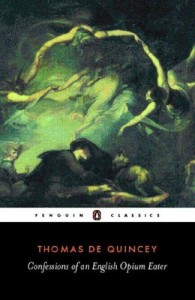
De Quincey's Confessions of an English Opium Eater is a strange little book which is quite unlike anything I have ever read. It's one of those unique pieces like Pale Fire or Herodotus's Histories where it does not fit neatly into any genre. In a way, it is a drug memoir, but it has large essay like portions and the most autobiographical piece is of a period of time where de Quincey ran away as a teenager and traveled through Wales and lived on the streets of London. It talks about the good and bad of Opium addiction, but that is idiosyncratic as well and less autobiographical. The bad effects of Opium are mostly limited to the freaky dreams that de Quincey has. It is in short, a unique little
quirky book.
De Quincey's prose style is also very quirky. It is closest to some of the more baroque examples of English 18th century writing and I suspect that it felt a little arachaic to his contempories (the book dates from 1822). It is also erudite, witty, charming and filled with classical references. De Quincey was a personal friend of Coleridge and the book is very much within the English romantic movement, but is widely informed by a large swarth of learning. At times de Quincey's prose style becomes so Baroque it does not work, but the wit and the charm of the piece in the end always keep it humming along.
De Quincey was constitutionally an outsider, so while his opium use does not have the back alley criminalized squalor of today, he did during his period as a runaway become intimately familiar with that world. De Quincy is one of those few persons who is as comfortable conversing with a teenage prostitute as an English lord and meets everyone on their own terms and instinctively treats them as equals. I'm like that as well, and as such I recognize in him some of the ingrained comfort with being half on the outside and half on the inside of everything. It is hard in de Quincy's case not to link these character traits with his opium use and de Quincy seems aware of the connection but never articulates.
While the criminalization of narcotics has so changed the culture of drug use that much of it is unrecognizable, the class stratification, and life in the underbelly is quite the same as it is today. I am always struck by the familiarity of street life that I find in Dickens, Orwell, Zola and others but de Quincy's is the earliest account that I am aware of a street life that remains today fundamentally unchanged.
The dream accounts are unforgettable and I am sure influential. I am a Lovecraft fan, and some of the dream passages are so reminiscent of Lovecraft that I was expecting at any time the word "cyclopean" to appear.
It would be hard to classify Confessions as amongst the greatest of all works, but it is clearly a very clever and eccentric work by a very clever and eccentric man. Also, its brevity means that there is a high reward for the time invested.
 2
2
Shakespeare's War Story
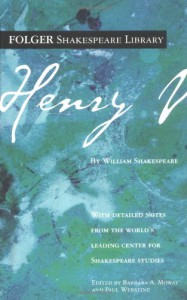
Henry V is Shakespeare's war play. While he often has wars in plays this plays focus is on war and also on Kingship. Shakespeare has always been interested in Kingship and is primarily interested in the character of Kings and what makes a good and bad King. To the extent that he has any political opinion, it is that usurpers are bad, which is not unreasonable given that they tend to trigger civil wars.
In Henry V, King Henry is represented as an ideal King, but that representation happens within the context of war. The civil duties of Kingship are not much touched upon. Further, while Shakespeare does talk about the horrors war, his focus is on the glory. It feels less deep than most Shakespearean treatments. While he captures perfectly the camaraderie of soldiers, which is why it has become the most referenced source of quotations on this. It none-the-less in the end feels one sided. There are apparently deconstructionist readings that focus on finding tensions in the heroism and personality of King Harry, but I think that those are illegitimate readings.
The King Harry of King Henry V, betrays the rascals of his youth, and while Shakespeare may well be right that a King should not tolerate that kind of behaviour, it sits uneasily because Shakespeare spent the two King Henry IV plays making those rascals adorable. In short what is bad about King Henry V is that it is considerably shallower than one would expect. Furthermore, unlike the two King Henry IVs the comedy and the serious scenes jar against one another and are not well integrated.
Having pointed to King Henry V's weaknesses which are surprising, I now want to point out its strengths. The language is Shakespeare and the actual construction of that language is as least as good as average for Shakespeare which means of course that it is amazing, brilliant and beautiful. Furthermore, the play contains many excellent scenes. I thought that I had never read or seen King Henry V, but in fact I had seen a production as a child and as I read the play many of those scenes emerged from my memory vividly as I saw them almost forty years ago. In particular, the scene with King Henry wandering the army camp before the battle of Agincourt, the scene mostly in French with Katherine and her lady in waiting and the Leek eating scene (which apparently made a great impression on my childhood self) are outstanding.
I'm left then with strongly mixed feelings about King Henry V and cannot put it amongst the best of Shakespeare's plays. It is clearly inferior to the King Henry IVs, but it contains many elements of genius. It is a play where the whole is less than the sum of the parts. That might seem harsh for what is still clearly a work of genius, but because it's Shakespeare my expectations were raised a bit.
 2
2
Maupassant's Une Vie

This is the first thing that I have read by Maupassant and I found it very enjoyable. It is very much a 19th century French novel, which I mean as a great complement. It focuses on the life of a woman in the French gentry and starts at the moment she leaves the convent in which she has been schooled completely unprepared for the realities of life, its squalor, deception and evil.
The book records her various disappointments and betrayals and is full of all the things that a good 19th century French novel should have - murders, love affairs, debts, and sex scenes that push the limits of what could be written. I am a huge Zola fan and it was Zola and Flaubert who were the primary influences on Maupassant which shows. The prose is constantly fascinating, and very much in the French naturalist tradition. Good fun with its melancholy bleakness. I'm definitely going to read more Maupassant.
I do not believe that "A Woman's Life" is the best translation of the title "Une Vie".
 2
2
Anne Bronte's Agnes Grey
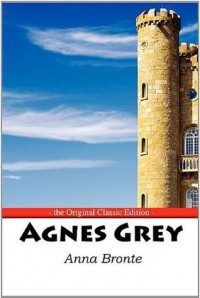
Agnes Grey is a good but not a great book. I found it to be inferior to Anne Bronte's other major work The Tenant of Wildfeld Hall and Anne is certainly not a genius unlike her more famous sisters. The book concerns the life of a young governess, who is disillusioned by her experiences in that role. It suffers from a kind of whininess. While the life of a Governess in the 1840s was not all that great it was certainly better than the life that most people led. There is a constant sense by the heroine (it is written in the 1st person) that she is being treated below her worth, but that is coupled with a lack of awareness of class issues in others. Coupled with that is a kind of priggish Protestantism that reminds me of Jane Austen at her worst.
Having said all that Anne was raised in an atmosphere of genius and a lot of it has rubbed off. Her prose is good and often excellent. The book moves well and is structured well and the character portraits good (although one often senses that they are unfair). I believe that this book would not have lasted if it wasn't for her more famous siblings, but having said that it is still a good book and an interesting look at the upper classes.
 1
1
le Carre's The Looking Glass War

I enjoyed this book but it did confirm my opinion that le Carre is an overrated writer. I pretty much new how the book was going to turn out from almost the beginning. Le Carre, at least in the novels that I have read, perhaps it is different with his later stuff, becomes predictable once you are used to him. It itself predictability is not bad, but le Carre has a habit of presenting as a surprise things that you see coming.
If le Carre wanted to surprise me, he would present a spying operation where every thing went according to plan and no one betrayed anyone, and everyone was a decent person acting for the right reasons. I don't mind pessimism, but le Carre feels a bit like a one trick pony. Having said that, the book was enjoyable and le Carre often writes prose very well. I certainly intend to read more, but he's not a great writer or as clever as everyone seems to think.
 2
2
Shakespeare's Comedy of Errors
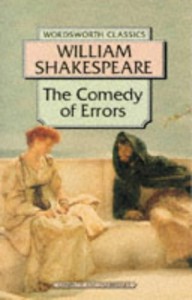
This is very, very early Shakespeare and it shows. The plot is that two pairs of twins have been separated at birth, with one being the master and one being the servant from each pair. Each twin has the same name as the other, so we have two servants named Dromio and two masters named Antipholus. Hilarious hijinks ensue when they end up in the same time and everyone constantly mistakes each twin for the other.
The play is out and out farce and entirely rests upon the mistaken identity gag. Its really got no subtlety to it at all and is a standard farce. The plot could come straight out of an episode of Three's Company because it is all mistakes. Its the most unsophisticated thing that I have read by Shakespeare. The language is quite pretty and the gags are good enough. However, even compared to something like Two Gentlemen of Verona it is straight-forward and relies a lot on slapstick humor. While, its perfectly fine, I certainly feel that I have read and seen things that are better. One can imagine it as an Elizabethan Fawlty Towers and that is a good comparison, because Fawlty Towers is both cleverer and funnier. This kind of thing is not really Shakespeare's forte and when he indulges in this kind of humor in later works, it is always a bit more than this and works on multiple levels. Its fine and fun, but Shakespeare at his fluffiest, safest and least original.
Cao Xueqin's The Dream of the Red Chamber
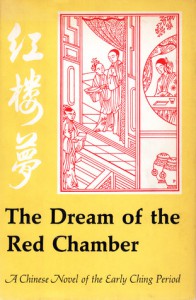
I was a little disappointed in this book. The version I read is radically abridged, so any judgment must be a little unfair. Never-the-less, while there are beautiful passages and chapters, especially the ones that are broadly speaking magical realism, it lacks a certain something. It gives an inside look at a well-off but declining family with there numerous members and servants and hangers-on. Its truly a journey into a foreign world, and of the Chinese books that I have read, China has never seemed stranger. Its a world where life is cheap and manners are everything.
However, Cao Xueqin does not really interrogate his subject matter. He is not really a particularly insightful author and accepts the reality of his cultures and characters with little comment. The magical bits provide a kind of commentary, but it is really a succession of incidents. The version I read is bound together by a love story between Pao-Yu and Black Jade, but I wonder how much this is just careful selection to make Western Readers feel at home. Its worth reading, but any book which seems most useful as a peak at a particular culture in a particular time period, can not, in my opinion, lay claim to true greatness. I have read an abridged version of Journey to the West, and I fully intend to read the whole thing at some point, because it is a work of genius. I cannot imagine taking the time to read an unabridged version of Dream of the Red Chamber. I'm glad I read it, but it does seem overrated to me.
 2
2
Athans' Baldur's Gate

I was a bit surprised by this book. I was feeling like reading some absolute fluff and took this down from the shelf for a read. It was significantly better than I expected. The low rating is just because I use one rating for all works of fiction, so its up against the likes of Hamlet and War and Peace. It might be that many of the virtues of the book, such as plotting and character are due to the videogame, which the book is based on. The videogame was by Bioware which is a very good company for plotting and character and has pushed the limits of what videogames can do. However, even if this is taken into account, the writing by Philip Athans is better than most writing for D&D novels and he knows how to set a scene and makes good choices throughout. Still its just meaningless genre fluff, but much better than one would expect.
Tacitus' Agricola and Germania

This is two short works by the Historian Tacitus. The Agricola is a biography of Tacitus' father in law and mostly focuses on his time campaigning in Britain. The Germania is not really so much history as a description of the ways of the people of Germany. Both works are minor, albeit fascinating. Tacitus is a good candidate for the second best of the ancient historians (after Thucydides) and his prose is great and his clever asides brilliant. The work is very enjoyable. There is good insight into the Germans for a Roman author, although one is always frustrated in that the Romans view other cultures so much through the lens of a military threat. That is not so bad here, but that is entirely the way that he sees the ancient Britains and nothing of there culture really comes through.
It is his various observations on this and that, so many of which are liftable straight out of his works and applicable anywhere. For instance, buried within a passage in the Agricola, he notes in passing that it is a part of human nature to hate someone that you have wronged. That's smart and he is full of that sort of thing. He is also a very good writer. Having said all that, these are still minor works, and not nearly as important as the Annals (I haven't read The Histories yet).
 3
3
Chandler's Farewell My Lovely

I like Chandler but I don't love Chandler. Chandler is rightfully most compared to Hammett, but unlike Hammett who has deep things to say, Chandler is all style. I don't think that Chandler is anything more than magnificently written pulp detective fiction, although there is no doubt that it is that. With both Fleming and Hammett I feel that there is more going on fundamentally and there is a stealth word view and ethics at play. With Chandler there is no such thing, but the craftsmanship is certainly there. The dialogue snaps and crackles, although Marlowe wise-cracks a little too much and in the end he is a lot less ambiguous a hero than he appears.
The only other Chandler that I have read is the Big Sleep, and I would say that this is better than that, although they are fundamentally very similar. Chandler is a master stylist, but perhaps in the end just that. Still, it was entertaining and enjoyable.
 3
3
Vaughn and Staples Saga

I read the first volume of Y: The Last Man and did not care for it at all, so I ended up reading this just because it was loaned by a friend, and it is really good. The writing by Brian K. Vaughan is good although the characterization and ideas are nothing special but the world building is solid. It is really more fantasy than science fiction which is perfectly fine.
What makes it really excellent is the art by Fiona Staples. While in the North American comic book tradition it is informed by some of the more serious continental comic book art and is really good and distinctive. She has both a dynamism and a touch of magic to her art, which is very enjoyable, although her interpretation of a tree rocket ship could be better.
I intend to keep reading this and it was a nice surprise from what I thought was an overrated comic book writer.
 2
2
Esquival's Like Water for Chocolate

This is a magical realist novel. Some people think that it is high literature, but it isn't. IT is very derivative of Garcia Marquez but without the wonderful language. The book is divided into twelve chapters named after the months of the year. That is done for no apparent reason that I could see and felt like a poorly executed gimmick. There is also a recipe for every chapter which is included into the chapter and where the cooking creates an accidental magic spell. The book is set during the Mexican Revolution but this is more a colourful backdrop than anything else.
In general, the book is a pop version of Garcia Marquez. It's not bad although the prose is very simplistic in a bad way. Its light fluff posing as serious literature. I have always preferred serious literature that poses as light fluff. It's magical realism for the bored unintellectual housewife really. It's not bad, it's just bland.
 1
1
Dante's Vita Nuova
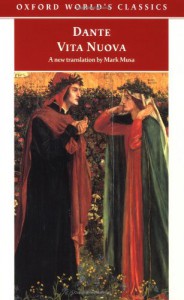
This is a little book of poems, mostly sonnets with surrounding explanatory text. The text tells of Dante's love for Beatrice and the poems mark this evolution ending in the intention to honour her in a way no poet has done, which of course will turn out to be the Paradiso. Dante is very much being Dante and combines the earthy with the heavenly, reality with the luminous. His view of love is so romantic and other worldly that it comes across as almost pathological although he was of course putting forward the dominant medieval view of love.
This strange eccentric book is however full of some of the most achingly beautiful love poems of all time. Dante was by any stretch of the imagination a genius and is by far the best writer of the middle ages. Its so very beautiful that it confirms Dante as my favorite poet and is undoubtedly a masterpiece. The translation by Mark Musa that I read is lovely.
 1
1
Rowling's Harry Potter and the Order of the Phoenix

This is the fifth book in the series and everyone will have made up there mind about Harry Potter by this point. I personally think that the books slowly improve as they go along. They also move away from Children's lit and into YA. This book is quite long and should have had 100 to 200 pages removed from it. It continues to be a strange mix of darker elements and sillier elements, but Rowling brings it off because her prose goes down smoothly. Not a masterpiece by any means, but a nice distraction from more challenging stuff.
The Dream Cycle of H. P. Lovecraft

This is absolutely not the place to start reading Lovecraft and is only for Lovecraft aficionados. Half the space of the collection is given over to two novellas: The Dreamquest of Unknown Kadath and the Case of Charles Dexter Ward. The Dreamquest is a grand tour through the Lovecraftian mythos and points back and ahead to all sorts of stories. It is not exactly good though and is told far too fast to work. It's amongst the weakest of Lovecraft's stories, but is fascinating to anyone who is familiar with his work. Charles Dexter Ward is much better and works very well and is a fairly typical Lovecraftian tale. In general the other works have a tendency to get better as they go along, but virtually nothing is without some interest. The Dreams in the Witchhouse is one of Lovecraft's best tales and it is surprising that it did not make it into The Best of Lovecraft anthology which is a companion to this collection.
For the Lovecraft fan only. Do not start here, but read and enjoy if you like him a lot.
The Winter's Tale: Shakespeare's Weird Fairy Tale

Spoilers
This is a very strange play. While Shakespeare stayed within the bare conventions of his time in writing plays he is fundamentally an experimental author and this play is one of his more experimental works. The play is nominally a comedy but the first three acts read like tragedy and then the comedy breaks out in earnest for the last two acts. The play also contains pastoral themes, but it has a plot that is essentially a folk tale. The plot is that a King becomes jealous of his wife who then dies with her son of the shame more or less and the daughter who the King believes his daughter is illegitimate exiles her. She becomes lost and is raised by a simple shepherd when a handsome prince falls in love with her. They then flee for love before the mystery is solved and everything works out fine.
The tone of the play dramatically changes at the conclusion of the third act. Up until that time the play is primarily a sort of Sophoclean tragedy and then it becomes Shakespeare at his silliest. The last two acts are as silly as As You Like It, up until the weird denouement of the play. Its clearly Shakespeare trying to experiment and the influence of fairy tales is very plain. The psychological realism is not there and the characters act as archetypes. Too me the whole thing prefigures something similar in the Tempest, but here it does not really come off. The play fails to cohere and the shifts and characters don't quite work. However, it was probably a necessary experiment that allowed the Tempest to be written later. The Tempest does something similar, but it works. It reminds me of Timon of Athens which is also a noble experimental failure and that play in my opinion prefigures King Lear. The play is very weird, including an unnecessary bear attack, which is quite confusing. The characters don't quite gel either.
I don't begrudge Shakespeare's failed experiment, because Shakespeare failing is better than most authors succeeding. That being said the only play that I have read by Shakespeare that I think is worse is Timon of Athens. Weird and strange.




 1
1